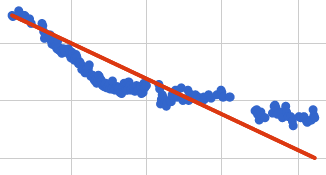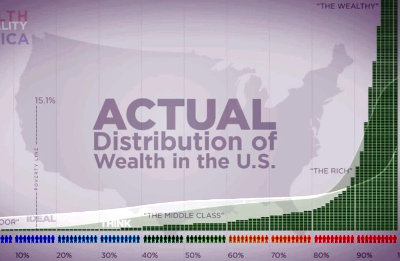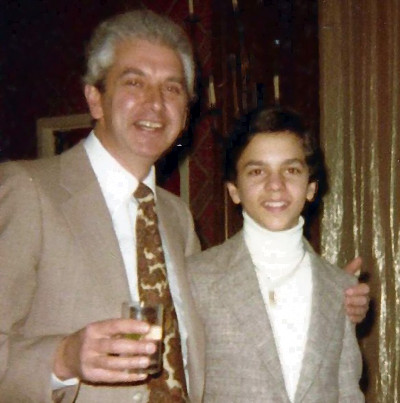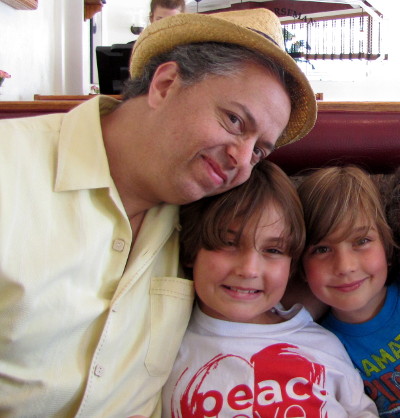If you don’t slavishly follow my every utterance on social media you might have missed some of these during the past year. (Now you’ll know what you need to do in the year to come.)
- The power of Downton Abbey: five minutes into the first episode of the first season, I, an avowed coffee drinker, hit pause and went to brew myself a cup of tea.
- George W. Bush
Nude self-portrait in shower
Please, not Cheney next
#newshaiku - [On the resignation of Pope Benedict XVI] Too pooped to Pope.
- My Uncle Al died today. I and many others will miss him. As sad as that is, it’s not nearly as sad as it is awesome that he lived. Funny, friendly, a mensch. He knew that the best kind of success is a large and loving family. If I have half the success he had in that department I’ll count myself lucky. If only all that love didn’t have to turn to sorrow now.
- Do you think that, when a dog sees someone they love coming closer, they’re all like, “OK, be cool,” but always forget about their tail totally giving them away?
- All this speculation in the trade press about the iWatch and similar devices, and not one mention of Dick Tracy. Am I too old, or are the reporters too young?
- Three words that I wish had different meanings so I could use them more: eleemosynary; chupacabra; speculum.
- Everyone’s giving Obama a hard time for his “Jedi Mind Meld” comment, as if he doesn’t know the difference between Star Trek and Star Wars. In fact he’s one step ahead of everyone else, having heard that Star Trek director JJ Abrams will next be directing Star Wars. They just didn’t get the joke.
- Four episodes in on Homeland, one of the vaunted “best shows on TV.” Not one thing that has happened has been surprising or interesting. Nothing rings true. There’s a lot of gratuitous fans-expect-it-because-it’s-cable swearing and screwing. And not only do I not care about any of the characters, I think I actively dislike all of them. Maybe that’s the whole point, but I don’t care – I give up.
- [After “springing forward.”] Attention daylight savings time whiners: you were happy enough getting that extra hour last fall. That doesn’t come for free, you know.
- Gave Andrea a bouquet of eight roses this morning, and a card with this poem: “Long ago / In ’88 / We went on / A datey-date / Each day since then’s / Been greaty-great / All eight thousand eight hundred / Eighty-eight!”
- I know this is probably obvious, but it’s still striking: walking around the offices of YouTube, you hear the word “video” an awful lot.
-
[Neither half of this rhyme is actually true, as far as I know, but it popped into my head anyway and I had to share it.]
Kids in France
They drink wine
Moms and dads there
Think it’s fineGive some wine
To your kid here:
Consequences
Are severe - Calling him a film critic is selling him short. Goodbye Ebert. “I think I’ll miss you most of all.”
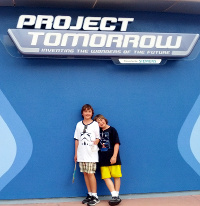 I told the kids, “You’re my Project Tomorrow.” Archer said, “I thought we were your Project A Few Years Ago.”
I told the kids, “You’re my Project Tomorrow.” Archer said, “I thought we were your Project A Few Years Ago.”- I am thrilled by the trend of progressive political victories in such areas as gay rights and easing marijuana prohibition. But, not to detract from those hard-fought battles, I have to say they feel to me like chipping away at the edges. There are big systemic problems in America needing progressive solutions, like the broken system of incentives in Washington, or the power imbalance between citizens and corporations. Next to that the right to smoke a joint is bread and circuses. Can we focus some progressive power on the big problems?
- This week I got terms-of-service update notices from Netflix and from AT&T, both emphasizing new mandatory-arbitration clauses, forcing me to choose between their services and having access to my country’s legal system. This needs to be made illegal.
- I think the time is right for a Spider-Man re-reboot.
- Major TV hosts of the 50’s: Milton Berle; Sid Caesar; George Burns; Groucho Marx. All Jewish. Major TV hosts since then: Steve Allen; Johnny Carson; Merv Griffin; David Letterman. Not Jewish. Discuss.
- The paradox of politeness: when someone’s assisting you with something, and you tell them “take all the time you need,” they’ll go faster for you.
- Wore a polo shirt the other day, first time in many years. Jonah said, “Dad, you’re buff!!” In the next instant he lifted up the front of my shirt and took a look. “Oh, never mind.”
- It bothers me that movie _trailers_ get hyped-up premieres.
- [Capsule summary of Man of Steel.] It’s a wonder there’s any of Metropolis left after all the kablooey.
- The first thing I ever saw James Gandolfini in was Crimson Tide. He played a character named Bobby Dougherty. I’m Bobby, and Andrea’s name at the time was Dougherty. That must mean something…
- Vintage cereal packaging works on me every single time.
- I hate that I’m more squeamish about letting my kids see the edifying and charming Shakespeare In Love, with its couple of scenes of simulated intercourse, than I have been about letting them see any number of movies full of simulated murder and mayhem. It’s the opposite of the kind of parent I said I’d be like.
- The scene in Man of Steel where Russell Crowe is around every corner showing Amy Adams the way to go: Was I the only one who thought of Jiminy Cricket in the Pinocchio ride at Disneyland?
- I don’t get why “is climate change man-made?” is a central part of the public conversation about climate policy. If damaging climate change is happening, shouldn’t we act regardless of why it’s happening? If a big asteroid were on a collision course with Earth, would we argue about whether humans put it on that collision course before deciding what to do about it?
- [California’s Proposition 8 is overturned.] Oh no, my traditional marriage is now under threat!
- New coinage from Archer: Drinking coffee gives you “coffeedence.”
- Secret laws aren’t laws.
- [On the 4th of July.] Happy 237th anniversary of a major progressive political victory!
- I thought World War Z was scary and exciting (and very much better than the overrated novel, which the filmmakers wisely jettisoned), but it suffered the same flaw as all zombie movies that aim for realism: a failure to reconcile the claim that the zombies are “dead” with the clear evidence that they’re not. They have voluntary (if coarse) muscular control; they can see and hear; they make respiratory sounds. In WWZ a scientist character says the zombies, being dead, have no functioning circulatory system. It takes only the merest understanding of biology to know this would make metabolism, and therefore locomotion, sensation, etc., impossible. Biology aside, thermodynamics demands that ambulating corpses should deplete, dehydrate, and literally fall to pieces with a few days at most. So in a real zombie apocalypse, if you can stay safely holed up for a week you should be fine.
- Took the boys to Kirk Lombard’s Coastal Fishing and Foraging walking tour in San Francisco yesterday. Got hands-on practice snaring and handling crabs, casting Hawaiian nets for herring and other small fish, using a poke pole to catch monkeyface eels, and more, all while learning amazing facts and hearing amazing stories about fishing in and around the Bay, told in entertaining style. Highly recommended!
- Was mildly appalled the other day to hear the kids singing Daft Punk’s Get Lucky, until I learned that the lyrics _aren’t_ “I’m up all night to get stoned, she’s up all night to get boned.”
- So glad we poured decades’ worth of national talent and treasure into defeating our secretive, authoritarian, and belligerent adversary in the Cold War.
- Bob’s gall bladder 1966 – 2013 RIP
- I was in the hospital for two days. During that time they barely allowed me to eat or drink anything. When I came home I was minus an organ. So how exactly did I manage to _gain_ weight?
- [After more than two decades in Northern California.] I miss summer rain.
- At SF airport. A big group of teen girls just greeted an arriving teen girl with unrestrained shrieks and squeals. You know the sound I mean. I’m curious: what’s the anthropological explanation for those outbursts?
- To understand spacetime, wrap your mind around this: the Big Bang happened in this very spot 13.8 billion years ago, and it’s also happening right now 13.8 billion light-years away in every direction.
- Don’t know how Jonah went 11 years without hearing the expression “the boob tube,” but he heard it from me today and is endlessly amused. Although I assured him it had nothing to do with the kind of boob he’s thinking of, he’s now riffing on the idea of tubes full of them.
- If I had run for president in 2008, I would have campaigned on restoring Constitutional checks and balances, improving governmental transparency and accountability, and rejecting unilateral military action – just like Obama did. If I had won, would I have kept those pledges, or is there something about the presidency that unavoidably subverts such intentions?
- I find the label “geek” offensive, but I don’t mind being called a “nerd.”
- If I ever develop the art form of folding paper into pornographic shapes, I’m calling it Origasmi.
- My Yom Kippur character: Atoney the Tiger. His product is Fasting Flakes, so terrible that it’s easy not to eat them. “They’re GRRRRR-oss!”
- The job title obstetrician-gynecologist is nine syllables long, which is a mouthful, so we abbreviate it to OB-GYN. But when we say OB-GYN out loud, we pronounce each letter, for a total of five syllables. We could just say the two syllables “ob” and “gyn,” but we don’t. It’s things like this that just drive me crazy.
- Semavore, n.: an eater of messages.
- Belatedly realizing I’ve liked Anna Kendrick in everything I’ve seen her in.
- Dear GOP, The way it works is, if a law you don’t like passes, you write another law repealing it and try to pass that. What you don’t do is shut down MY government and wreck MY country’s credit. Hope this helps, – Bob
- You know how a song sometimes gets stuck in your head? Right now I can’t stop hearing the sound of NPR reporter Mandalit Del Barco saying her name as she ends a report and signs off.
- A greater proportion than ever before of household timekeeping devices can adjust themselves to and from Daylight Savings Time automatically. This only produces a creeping contempt for the ones that cannot.
- Cut oranges into sections; dice each section; place in dishes. Split English muffins, place in cold toaster oven. Place Costco precooked bacon strips on paper towels on microwave-safe plate. Preheat griddle. Measure pancake mix, water, and milk into bowl. Mix. Turn on toaster oven. Spoon pancake batter onto griddle. Place forks, knives, butter, syrup, and dishes with diced orange sections on table. Flip pancakes. Microwave bacon. Place pancakes, English muffins, and bacon on plates. Place plates on table. Presto: breakfast for four boys (two Glicksteins and two sleepover guests).
- After seeing Cloudy With a Chance of Meatballs 2 a few days ago, the kids have been on the lookout for pun-making opportunities. So when Archer and I were in the kitchen recently and we both injured ourselves trying to open a tight jar lid, and even the tight-jar-lid-opening tool could barely do the job, Archer summed it up like this: “Well, _that_ was… screwed up.”
- “Thomas Hobbes and Charles Darwin were nice men whose names became nasty adjectives. No one wants to live in a world that is Hobbesian or Darwinian (not to mention Malthusian, Machiavellian, or Orwellian).” -Steven Pinker, _The Better Angels of Our Nature_
- After today, Andrea Glickstein and I will never again be able to say that we’ve been sweethearts for less than a quarter of a century.
- Enchanted. Brave. Tangled. Frozen. Wondering when the current vogue for one-word adjectives as the titles of Disney movies will end. I blame Lost (another Disney production).
- I’ve seen The Sting any number of times; and I’m the former Quotes Editor of the IMDb, with (what I like to think of as) a special ear for movie dialog. But it took Jonah to notice, when we watched it last night, that Paul Newman uses the phrase “two, three hundred” twice to estimate a number of guys. Proud of my boy.
- [Christmas morning.] Good morning, and merry Christmas! I am enjoying the half hour of caffeination time that I negotiated with my kids last night before the wrapping-paper carnage begins.
